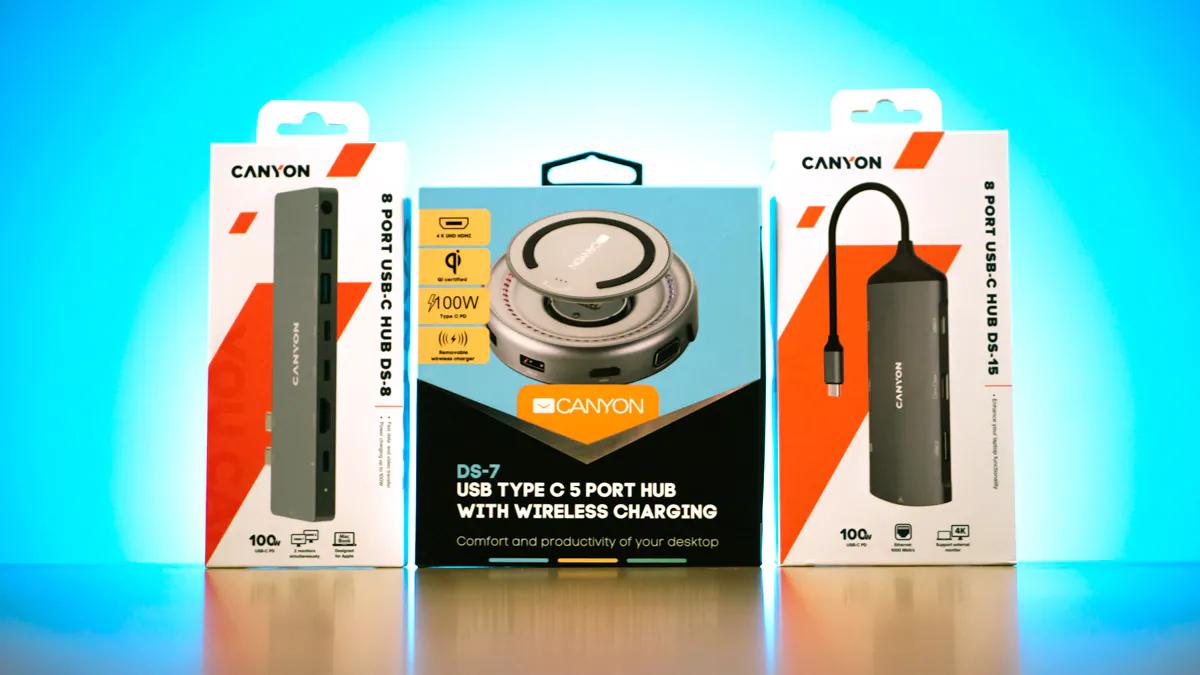
The main thing you need to know about the Canyon DS-7, Canyon DS-8, and Canyon DS-15 hubs is that their recommendation requires context. I definitely recommend these models, and my recommendation is absolute at the moment… But not to everyone. And now I will tell you why.
First of all, the price. I can’t call any of these hubs cheap; they are in the middle segment, which tends to be at the top. That is, from 2 to 3 thousand hryvnias. Or about $70. Actually, if it seems expensive to you, just look at the price of competitors. Not low-end Chinese, but competitors. The questions will disappear.
Each of these hubs is a laptop hub. And if you have a laptop with at least one USB Type-C 10 Gbit, which supports DisplayPort and Power Delivery, you can use any of these gadgets to the fullest.
With the exception of the DS-8. While all other models are universal, this one is exclusively for Apple MacBooks, which have a dual USB Type-C input on the side, including MacBooks on M1. Actually, if you have another non-Apple laptop, then it would be illogical to recommend DS-8, so here goes.
Actually, here I will move on to the undeniable advantages of the hubs. They are of high quality. Not all are metal, but all are made in such a way that there is nothing to complain about. Even where there is plastic, it is of high quality, well-painted, and quite durable. In fact, the only partially plastic model is the Canyon DS-7. All the rest are metal.
At the same time, I can easily forgive the hub for the plastic, because the model is unique – in addition to a set of peripherals, it has a Qi charging station on top. Which can be detached and used separately! Or you can connect it to a laptop and use everything together.
The hubs are almost identical. There is always at least one USB Type-A, at least one USB Type-C for a 100W power input, and at least one HDMI. DS-15 additionally has a card reader, and DS-7 has a VGA connector.
And, oddly enough, it is based on the latter connector that I will recommend the hubs. Because as you may have already realized, despite the elegance and build quality, these hubs are sometimes outdated.
Starting with the descriptions, which include, sorry, Windows 7 and a TF memory card, to the 10W Qi charging speed. To give you an idea, this was relevant in the days of the Samsung Galaxy Note 5. And modern smartphones may even refuse to take 10 watts because it’s too little.
So don’t be surprised that HDMI is version 1.4, not 2.0 or 2.1. And don’t expect to display the image from your laptop on a 6K or 8K monitor. 4K 60 FPS is the maximum. Or 6K 30 FPS, which I don’t recommend, because try working on something that has a 30 Hz refresh rate. It’s very unpleasant. Especially if you’re used to 60.
BUT! If you have a Full HD monitor for work, either an old or a new gaming monitor, then I recommend hubs. Because HDMI 1.4 outputs 144 Hz in Full HD, and VGA is just right for inexpensive models.
And I’m sure that with the rise in prices for everything in general, you will 100% look at Full HD options when choosing a monitor for work. Actually, if you have a mid-budget laptop, then a high-quality Full HD monitor should be enough for you to work with no problems.
Of course, this is a temporary advantage, but it is there. After all, fiddling with VGA adapters when using old monitors is a pleasure mainly for enthusiasts, and if you want only Plug and Play, which is promised on the boxes with hubs… It’s better not to be wise and use native connection types.
And for those who are interested in the full characteristics of the hubs:
Canyon DS-7:
Canyon DS-8:
Canyon DS-15:
Surprisingly enough, the Canyon DS-7, Canyon DS-8, and Canyon DS-15 hubs are more relevant than ever. Old-school peripherals allow you to quickly and painlessly use monitors that can save you money.
This does not in any way negate how much I want Canyon to update the port versions to the latest ones. Because nothing else should be changed in the hubs except for this.
Read also:
Leave a Reply